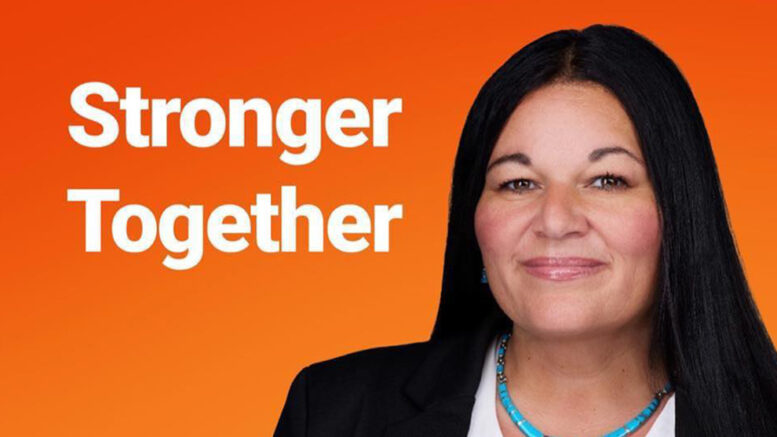by Chevi Rabbit, Local Journalism Initiative Reporter
(ANNews) – Jodi Calahoo Stonehouse, a political contender for the Alberta NDP leadership race, brings a unique blend of personal experience and academic expertise to the forefront of her campaign. With a strong focus on policies surrounding water rights, especially concerning farmers and Indigenous communities, Stonehouse’s background and education set her apart as a candidate with a deep understanding of the issues at hand.
Born to a Mohawk and Cree mother from the Michel First Nation and a Métis father, Stonehouse grew up immersed in both First Nation and Métis cultures. Reflecting on her childhood, she recalls the pivotal moment when her mom married her stepfather, introducing her to what she terms “the white world.” This early exposure to diverse cultures laid the foundation for Stonehouse’s commitment to inclusive policies that honour Indigenous rights while addressing broader societal challenges.
Stonehouse’s education further equipped her to tackle complex issues such as water rights. She pursued a Bachelor’s degree in Native Studies at the University of Alberta, followed by studies in Indigenous Law at the University of Victoria. Her academic journey led her to delve into the intricacies of Canada’s multi-juridical state, exploring how Indigenous legal principles can be integrated into mainstream justice systems.
With a Master’s degree in resource economics from the University of Alberta, Stonehouse focused her research on the transformative impact of water, particularly downstream from the Alberta oil sands. Armed with this interdisciplinary background, she brings a comprehensive understanding of environmental economics and resource management to her political platform.
Stonehouse’s campaign revolves around the urgent need to address water rights for farmers and Indigenous peoples. Drawing from her personal experiences and academic insights, she emphasizes the interconnectedness of environmental sustainability, economic prosperity, and social justice. In her own words:
“As a First Nations woman, I come from a value system where no one gets left behind and there is room for everyone at the circle. I believe that as a party we are stronger together, working together, unified and alongside Albertans, to build the strongest Alberta together. In Alberta we are headed to some difficult times, facing drought and forest fires. We are going to sit together, farmers, ranchers, industry, business and citizens, and we are going to make policy to ensure that each and every one of us has access to the water that we are going to need. We have to make some changes around our energy diversification. We’ve got to do better Alberta and we are going to do better with an extraordinary team that I am leading.”
“As we think about even being in this position of a political campaign, there was a tweet that went out that acknowledged the fact that I have to work two to three times harder than my fellow colleagues, particularly at fundraising. We are the poorest people in the country, statistically speaking. And when I look at my donations, I’m humbled by the support of everyday people who contribute despite their own financial struggles.”
Stonehouse’s platform advocates for policies that prioritize water conservation, equitable access, and sustainable agricultural practices. She highlights the alarming trends of soil erosion and water scarcity, stressing the need for proactive measures to protect Alberta’s agricultural economy and natural resources.
“We need to base our response on what we are hearing from ranchers, farmers, and scientists. We must develop strategic plans to promote alternative farming methods like aquaponics and hydroponics, ensuring food security while adapting to changing climate patterns.”
Moreover, Stonehouse emphasizes the importance of honouring treaty rights and Indigenous perspectives in water management strategies. She envisions a future where collaboration and mutual respect guide decision-making processes, echoing Indigenous principles of living together as relatives.
“In our treaty, we have premises for coexistence as relatives, rooted in reciprocal relationships. We must look after one another and consider the well-being of future generations. That’s why my campaign is driven by the imperative to safeguard water rights and address the systemic injustices that threaten our communities.”
Stonehouse draws inspiration from her grandfather, who imparted invaluable teachings rooted in Indigenous wisdom. Reflecting on her upbringing, she shares:
“My grandfather was like my best friend. I would get up in the mornings and sit at the table, and he would call me his little lawyer. We were out on the trapline together, and I never felt like I didn’t belong there. He taught me about our connection to the land and the importance of stewardship for future generations.”
As Stonehouse continues her campaign journey, her unwavering commitment to water rights advocacy serves as a beacon of hope for farmers, Indigenous peoples, and all Albertans. With her unique blend of personal experience, academic expertise, and compassionate leadership, she offers a compelling vision for a more equitable and sustainable future.



Be the first to comment on "Jodi Stonehouse: Championing Water Rights for Farmers and Indigenous Peoples"